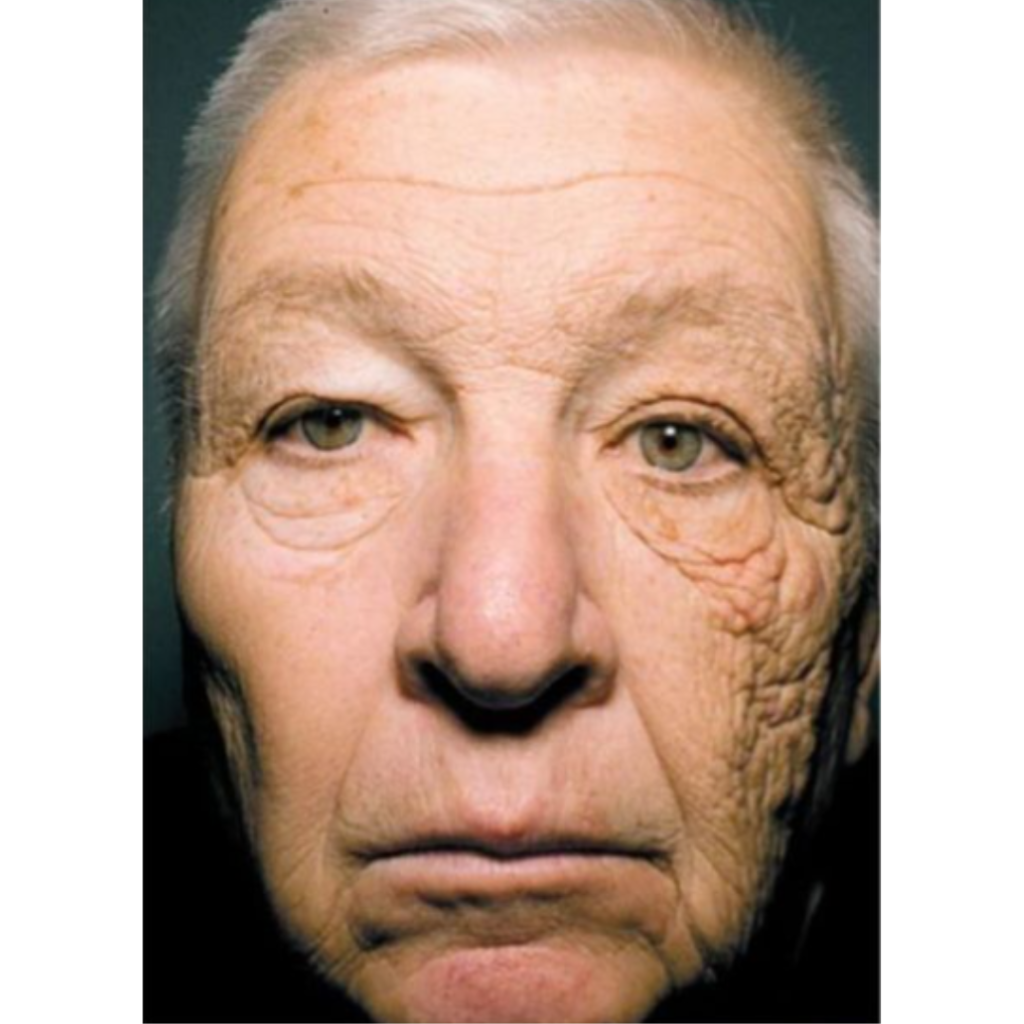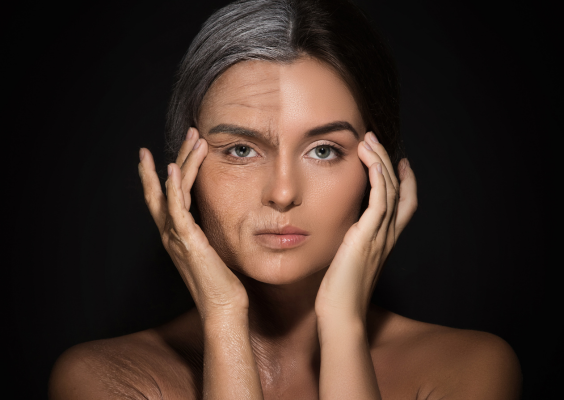Our skin is an amazing organ that protects us from harmful external influences, but it is also one of the most vulnerable parts of our body. Skin aging is a natural process influenced by various factors, with one of the primary external causes being exposure to the sun. In this blog post, we will explore how the sun affects our skin and why it is crucial to protect ourselves.
How the Sun Affects Your Skin Back to basics, as it cannot be emphasized enough. The sun emits various forms of radiation, including ultraviolet (UV) radiation. This radiation consists of UVA, UVB, and UVC rays, of which primarily UVA and UVB reach our skin. When our skin is exposed to UV radiation, these rays penetrate the epidermis, the outer layer of our skin. Here, they can cause damage to the DNA of our skin cells, leading to various signs of aging. These include:
1.Wrinkles and Fine Lines One of the most visible signs of sun-induced skin aging is wrinkles and fine lines. UV radiation breaks down collagen and elastin, the fibers that keep our skin firm and elastic. Over time, this leads to a loss of firmness and resilience, resulting in wrinkles and fine lines, especially around the eyes, mouth, and forehead. In the image below, a woman’s face displays a striking asymmetry. The left side exhibits an abundance of wrinkles, a consequence of prolonged exposure to sunlight streaming through her truck’s window during long hours on the road. In contrast, the right side appears comparatively smooth, underscoring the profound impact of sun exposure on skin aging. To emphasize again: UVA rays are present year-round and easily penetrate surfaces such as glass and car windows. By applying sunscreen, you directly reduce the effects of sun exposure on your skin and health. If you would like to read more about collagen, read our blogpost: “Kollagen und Sonnenschutz: Die besten Freunde deiner Haut”


2.Pigmentation Issues Exposure to the sun can also cause pigmentation problems, such as age spots, freckles, and hyperpigmentation. This is because UV radiation stimulates the production of melanin, the pigment that gives our skin its color. This can lead to dark spots and discoloration, which can make the overall skin tone uneven. In this picture we see a twin study where the difference between the two women is made significantly clear. Twins, standing side by side, but their skin tells different stories. While one sister bears numerous pigment spots, a result of inadequate sun protection, the other’s complexion remains clear. The contrast serves as a stark reminder of the importance of shielding our skin from harmful UV rays. Our Daily Protection Hydrating Day Cream is the perfect day cream against pigmentation disorders.
3.Skin Sagging In addition to breaking down collagen and elastin, prolonged exposure to the sun can also lead to skin sagging. This is because UV radiation inhibits collagen production and accelerates its breakdown, causing the skin to lose its firmness and elasticity. This can result in sagging skin and the appearance of drooping areas, especially on the cheeks and jawline.
4.Changes in Skin Texture UV radiation can also lead to changes in the texture of the skin, such as rougher, duller skin. This is because constant exposure to the sun disrupts the natural shedding of dead skin cells, causing them to accumulate on the skin’s surface. This can result in uneven skin texture and a dull complexion, making the skin appear older than it actually is.
The sun can thus damage the DNA of our skin cells and lead to various signs of skin aging. But this is far from everything. We would like to highlight three more reasons why protection against the sun is essential:
1.Reducing the Risk of Skin Cancer In addition to causing skin aging, exposure to UV radiation can also increase the risk of skin cancer. By protecting yourself from the sun, you can reduce the risk of developing skin cancer, including melanoma, basal cell carcinoma, and squamous cell carcinoma. Over 100 thousand cases of melanoma skin cancer were registered in the European Union in 2020, while over 16 thousand deaths were recorded across the continent that same year. Northern European countries such as Denmark, the Netherlands, and Norway are among the countries with the highest rates of skin cancer in the world.* Experts estimate that 20,000 to 25,000 people in Switzerland are diagnosed with some form of skin cancer – usually basal cell carcinoma, every year. The average age of those affected by basal cell carcinoma is 60, although an increasing number of younger people are also developing the disease. Men and women are affected about equally often.* You can read more about skin cancer in our blog: “Deine Haut schützen: Die Fakten über Hautkrebs verstehen.”

2.Maintaining a Healthy Skin Barrier Our skin barrier plays an essential role in protecting our skin from harmful external influences, such as bacteria, viruses, and pollution. By protecting yourself from the sun, you can maintain the integrity of your skin barrier and prevent harmful substances from entering and causing damage.
3.Preserving an Even Skin Tone By protecting yourself from the sun, you can also help maintain an even skin tone and prevent pigmentation problems. By regularly using sunscreen and wearing protective clothing, you can prevent dark spots and discoloration, leaving your skin looking radiant and youthful.
It is clear that the sun can be incredibly harmful to our skin. Protecting ourselves against it is therefore essential to prevent skin aging. But there is more we can do. Various habits and practices can help slow down the signs of aging. Here are some key factors:
- Sufficient Sleep: Good sleep is essential for the body’s recovery, including your skin. During sleep, your body produces growth hormones that promote cell regeneration and repair, helping to keep the skin firmer and smoother and reducing signs of aging.
- Exercise: Regular exercise stimulates blood circulation and promotes the delivery of nutrients and oxygen to the skin cells. This can help the skin look healthier and more youthful while also contributing to overall health and vitality.
- Sunscreen: Using sunscreen is one of the best ways to protect your skin from damage caused by UV radiation, a major cause of premature aging. By using sunscreen daily, you can help prevent wrinkles, pigmentation problems, and other signs of aging. On this page, you can learn more about our Daily Protection Liquid Foundation and the Daily Protection Mineral Loose Powder that both contain SPF 50+ and are the perfect complement to the Daily Protection Hydrating Day Cream.
- No Smoking: Smoking has numerous negative effects on health, including skin health. Smoking accelerates the aging process of the skin by narrowing blood vessels and reducing blood flow to the skin cells. This can make the skin look dull, gray, and older than it actually is.
- Limiting Sugar Intake: Excessive sugar consumption can lead to glycation, a process in which sugar molecules bind to proteins in the skin, making them stiff and less elastic. This can lead to the formation of wrinkles and a loss of firmness and elasticity in the skin. By reducing your sugar intake, you can help slow down the signs of aging and keep your skin healthy.
Conclusion
Protecting our skin from the harmful effects of the sun is crucial to prevent premature aging, pigmentation problems, and even skin cancer. By regularly using sunscreen, wearing protective clothing, and avoiding excessive sun exposure, we can maintain the health and youthful appearance of our skin in the long term. But in addition to external protection, there are also internal factors at play in maintaining healthy skin. Sufficient sleep, regular exercise, avoiding tobacco products, and limiting sugar intake are all important habits that can contribute to radiant and youthful skin. By combining external protection and internal care, we can help our skin maintain its natural beauty and enjoy a healthy, radiant complexion regardless of our age.

